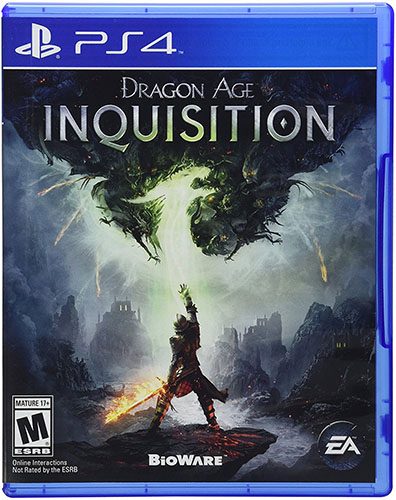
Video games are first and foremost a kind of entertainment. They’re a form of media meant to entertain those who enjoy it, just like movies, books, and music. The main goal of most video games is “fun.” But just like movies, books, and music, video games can also make people think. They can stir up a wide range of emotions in players. They can have political messages hidden inside their stories - sometimes subtly, sometimes not. And video games can cause just as much commotion in the world, even amongst non-gamers, for their content and messages as any other form of media.
Video games also face a lot of censorship. They follow a rating system just like movies, and that rating system can also determine if a game is even legal to sell in some countries. These ratings and censorship mostly affect big games and big companies that are out to make a lot of money, so the companies think more about the content that they make to be sure they can still sell their product. Some games, though, are made by smaller independent groups that are willing to take risks to say whatever message they want or have whatever content they desire.
Our question today is, should video games be allowed to spread whatever message the developers want? And are there subjects that should be avoided in games, or is everything okay because it’s up to the designer and player? Is there such thing as “too much” in a video game, or should freedom of expression reign supreme above all other rules? Read on to explore this question a bit with us as we specifically explore violence and sex in video games, two of the hottest and most contested issues! We don’t want to make an answer for you; we just want to get you asking these questions yourself so that you can make your own opinion.
Too Violent
A huge question in today’s world is whether or not video games are too violent, and if that violence is transferring into real life and making gamers violent, too. Violence has been a huge part of video games nearly since they started, with even classic games like Mario and Donkey Kong having some level of violence inherent in beating the story. Today, games have become even more violent, with blood, carnage, and gore commonplace in many action, adventure, and horror games.
With the rise of violence in games, the censorship of said games has been on the rise, too. Some countries like Australia have incredibly strict laws about the level of violence allowed in games and have banned popular titles like Mortal Kombat entirely. Other popular titles, like The Punisher (2005) changed some of its content when it was initially stamped with the “adults only” rating for violence that would keep it from being sold on Microsoft and Sony consoles.
But what about smaller games? Beyond usual violence, some independent games have created violent games that have political messages and agendas behind them. Take Ethnic Cleansing for an example, a game made by National Alliance in 2002. It’s an entire game about killing minorities in America violently in a slum, taking on the role of a KKK member or Neo-Nazi. Ethnic Cleansing wasn’t made by a big game company, it was made by a white supremacist organisation. That means it doesn’t have to abide by the rules of trying to sell well to a general audience; National Alliance knew exactly who they were making their game for. Does that make it okay? A chance for freedom of expression in the media?
Too Sexual
Another huge point of contention in video games is sex. While many major video game series like The Witcher, Mass Effect, Dragon Age and more feature sex scenes and nudity right in the game, there are a lot of arguments against having this sort of content available in video games. And that doesn’t even touch on the entire erotica game genre - though arguments can be made that players only seek out erotic games knowing exactly what they are going to get, and that genre of game has to be actively sought out rather than picked up at your local game supplier.
Sex in video games has especially become a recent question due to video games’ historical depiction and over-sexualization of women. Famous titles like Tomb Raider were arguably made for the male gaze, and even have mods out there to make Lara Croft naked for the entire game. Thus many are advocating towards a better depiction of female characters in games, especially with a steady rise of female gamers that goes up more and more every year. But what about actual sex? After all, in games like Mass Effect women can play as a female character and choose to have sex with a man or woman (aliens included, in this particular example). Is it okay?
Taking the question of sex in video games one step further, what about nonconsensual or “aggressive” sex? One of the most famous cases of this was in 2004 when the “Hot Coffee” mod was released for Grand Theft Auto: San Andreas, which unlocked existing coding in the game for a sex mini-game with the playable character’s girlfriend. The mini-game included sexual scenes that some considered aggressive, not to mention the controversy that the mini-game existed at all despite the game not having an “adults only” rating. But the argument remains that players never had to download the mod (though later versions of the game replaced the coding in question entirely).
A much more extreme example is the 2006 Japanese game RapeLay, which let players stalk and rape a mother and her two daughters. It also includes scenes of taking photos of their semen-covered bodies and eventually locking them up as sex slaves in the basement. RapeLay caused international controversy for its content, and it was banned in many countries and even Japan faced some backlash for allowing the game to release at all. The other side of the argument, though, is that despite murder being generally seen as a more heinous crime than rape, why is murder in video games okay, but rape isn’t?
Should video games really be exploring either of these subjects?
Final Thoughts

Video games are just the latest addition to the questions of what is acceptable to depict in media and what isn’t. Should developers be able to put any subject they want to explore in their games since players can just not play the game if they don’t want to see that content? Or should there be limits placed on what is and isn’t okay to put into a game? These are questions that have been asked for at least the last twenty years and will continue to be asked in the future as games become a bigger and bigger part of our world.
So where do you stand on the issue? Do you think there should be more regulations in the content of video games, or should it be left up to the discretion of the gamer and developer? Are some subjects okay while others are not? Drop us a comment below, we would love to hear your opinion?

